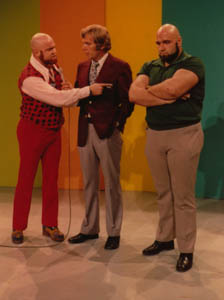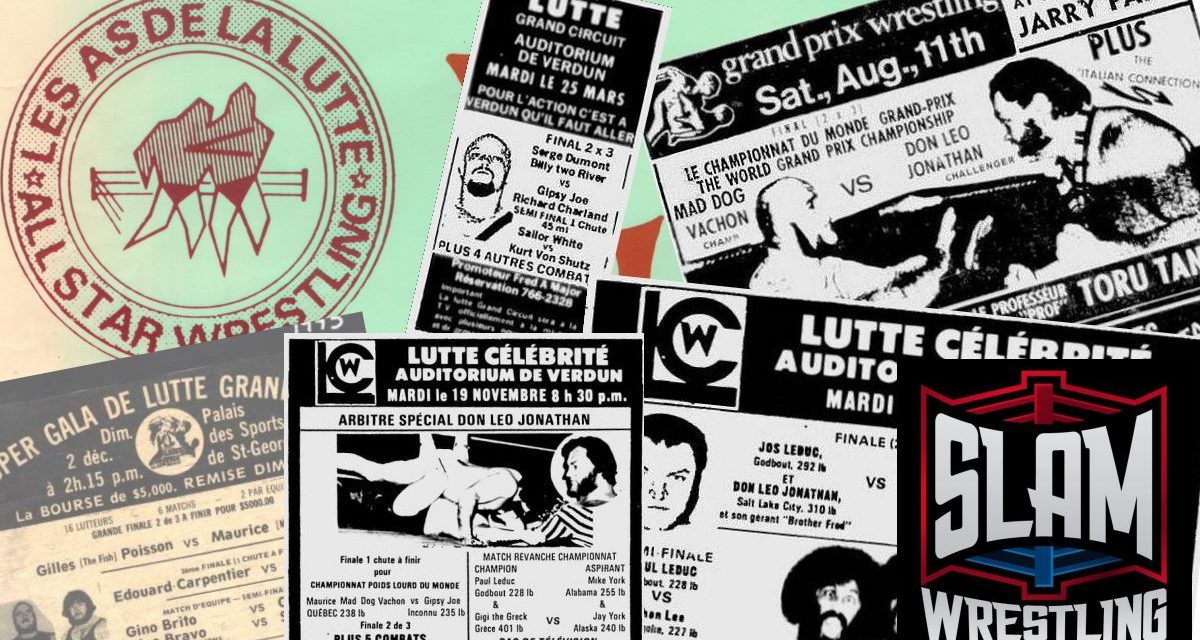The obituaries that have run on well-loved Montreal TV and radio personality Jack Curran over the past few days have talked a lot about the many different shows that he hosted, his work behind-the-scenes at CFCF-12. But this story isn’t about that; it’s about his years hosting Montreal’s Grand Prix Wrestling in the early 1970s.
In short, Grand Prix had probably the greatest collection of talent ever collected in a Canadian promotion. Paul and Maurice Vachon decided to come home and settle down after years on the road, and teamed with a variety of partners, included Yvon Robert Jr., to go into competition with Johnny Rougeau’s established promotion, All-Star Wrestling / Les Etoiles de la Lutte.
The Vachons brought in all their friends – Killer Kowalski, Don Leo Jonathan, Edouard Carpentier, Billy Two Rivers, the Leducs and the Hollywood Blondes (who both jumped from Rougeau’s promotion). But in the end, a collection of wrestling talent is only as good as the presentation.
The Grand Prix shows were initially taped at the Verdun Auditorium, but were soon moved to the CFCF studios. Taping shows for both the English-language CFCF on channel 12 and the Sherbrooke-based CHLT, channel 7 in French, was a challenge for Grand Prix. “Sometimes we had the French commentators on one side, the English commentators on the other,” said Gino Brito Sr.

Jack Curran interviews Joe & Paul Leduc in Grand Prix Wrestling. Photo courtesy Paul Leduc
The anchor of the Grand Prix English-language show was Jack Curran, who died Thursday in Ottawa at 71 from cancer.
Other the years, Curran was paired with a variety of colour commentators including promoter Paul Vachon, wrestler Luigi Macera, Ottawa sports broadcaster Ray Boucher, and Jack Britton, who was an ex-wrestler and promoter and the father of Gino Brito.
“He was the best,” recalled Paul Leduc. “When he was teamed up with Ray Boucher, on CFCF, Channel 12, they were the best team. I will say they were almost close, maybe better, than J.R. and the King Lawler. They were really good commentators. For the interviews, he was always asking the right questions.”
Gilles “The Fish” Poisson also recalled the interviews, and recalled the profound impact that Curran had on helping the Francophone wrestlers get their message across in English. “He was a helluva guy. He could help us to get what we wanted to say,” said Poisson. “He coached us in a way. Sometimes we didn’t have the word to say it, what we wanted to say.”
But, according to Leduc, Curran was open to suggestions for his interview segments too. “He was the kind of a guy, if a fan would phone the station, and wanted him to ask a type of question, he was willing to put the question from the fan in the interview or when he was doing the commentating.”
John Woods was one of those fans who watched the show religiously in Montreal, and who later became involved in wrestling as a journalist, historian and manager. “Jack Curran added comedy to whatever he’d done. Most of the guys in that era were very, very straight-laced. They were sitting there with their suits and ties, reading off their cue cards. Jack Curran would always throw in a joke. Jack Curran would be himself. That’s what I got a kick out of — Jack Curran, because he’d always have to throw in something that no one expected at the last moment, kind of like the Ed Whalen-type. I really enjoyed that.”
Like Whalen, Curran would have his moments with the bad guys. “He’d pick on the heels as soon as they were away from him, far away. I used to laugh at that, and so did everybody else. It was wonderful,” said Woods. “Him and Killer Kowalski, they had some great interviews. Killer would rant and rave about his clawhold, that he was going to be the next Grand Prix champion. Jack Curran would be so straight-laced, and say, ‘Of course, Killer, of course.’ Then as soon as Killer would walk off the set, he’d always have something to say or something sly look at the Killer as much as to say, ‘Well, if you’re going up against Don Leo Jonathan, you be careful.'”
Gino Brito though that Curran was a very “affable” man, and a pleasure to work with. But hosting the show was one of the many jobs for Curran at CFCF, and he didn’t socialize with the wrestlers. “You wouldn’t call him a mixer as far as I am concerned. He used to come and do his job and was very nice about it. Then we’d see him for TV. That was about it. He never made the towns or anything like that, just the tapes,” said Brito.
Curran was born in Grand Falls, N.B., on Nov. 11, 1932 and began his broadcasting career at 16 locally. Eventually, he went to Halifax and Ottawa before arriving in Montreal. CFCF started up in 1961, and Curran was hired from the start, hosting shows like Sunset Theatre, Little White Lies and Movie Matinee, as well as doing news, weather and entertainment pieces. John Woods especially remembers Cliffhanger Theatre. “It was a half-hour show, really campy stuff to our standards now. Back then, we were thrilled with it. It was usually a really cheaply put together science fiction or western and he would introduce it, he was the host. We’d really enjoy this. I used to come running home from school and I got home to see this show.”
Curran also appeared on the CBC’s Fine and Dandy, and The Way Things Are, also did local theatre. He was the advertising face for Dow Breweries, and was the voice for advertisements for Kool cigarettes and Edsel cars on the Ed Sullivan Show.
In a historical piece on the great Kayfabe Memories web site, historian Daren Gleason talked about Curran’s role with Grand Prix. “Curran was a relative novice when it came to detailed wrestling knowledge but he never let that get in the way of having a good broadcast. Unlike many outsiders to whom the local wrestling show was just another way to make a few extra bucks, it was plain to see that Curran truly enjoyed what he was doing and never belittled the product or talked down to his audience. In fact, in later years, Curran often remarked how fondly he regarded those years and how much fun he had in doing the show.”
After Grand Prix Wrestling shut down, Curran was brought in by George Cannon to work with his Superstars of Wrestling promotion in the late ’70s. He lasted about six months. “That was never one of Jack’s highlights,” said Woods. “He got out of there pretty quick.”
Curran retired from broadcasting in Montreal in 1991. Still, having moved to Cornwall, Ontario in 1997, he found himself on the radio again.
Funeral arrangements are not known at this time.

